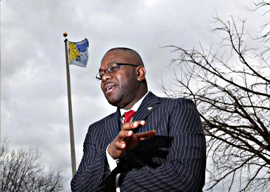
March 13, 2013

Marco McMillian
The bereaved family then issued a press release claiming that the victim had been “beaten, dragged and burned (set afire).” These words triggered a Pavlovian media mania, complete with stock references to the dragging death of James Byrd in Texas and the beating death of Matthew Shepard in Wyoming. (Texas, Wyoming, and Mississippi…why, they all voted for Romney!)
On March 5th, the Times tried to quell the hysteria with another surprisingly responsible story:
A Mississippi mayoral candidate who was found dead last week was not killed by being beaten, burned or dragged, the coroner said on Tuesday, challenging a statement from the victim’s family that the official said was misleading.
But that only had a modest dampening effect on the flames of press hatred.
The most striking thing about McMillian’s “mysterious” murder is its lack of mystery. There’s no need for conspiracy theories because the killer, a poor 22-year-old black man named Lawrence Reed, confessed last month. The cops didn’t even know the missing man was dead until Reed crashed the victim’s stolen SUV on February 26th, then confessed where he’d stashed the body. The auto accident, which might have been an attempt at suicide, happened moments after Reed, who had become friendly with McMillian at a Clarksdale bar, told female friends that he’d strangled the politician with his wallet chain.
That’s about as open-and-shut a case as there is. (The killer’s precise motivation will no doubt be argued over at the trial. Carjacking? Thelma & Louise-style rape resistance? Gay lovers’ quarrel?) But London’s Daily Mail had the black killer’s picture on February 28, more than a week before the Washington Post splashed the story.
One of the reasons the national media keeps making ever-stupider mistakes about local police-blotter items is that pragmatic wisdom about human beings is increasingly demonized as stereotyping. For example, there’s a two-word phrase that ought to have occurred to journalists when thinking about a case involving an affluent 34-year-old gay and a poor 22-year-old, and it’s not “hate crime.” Instead, it’s “rough trade.” But that term seems to have disappeared from public consciousness for being “homophobic” (i.e., not on GLAAD’s Approved List).
When my wife and I owned a condo in Chicago two decades ago, we suddenly started running into strung-out young men on our building’s interior staircase. Who was buzzing in 19-year-olds in black leather? And why?
We figured out that our upstairs neighbor, a fat, middle-aged, effeminate white corporate comptroller, had developed a taste for rough trade.
That’s not extremely rare. Some affluent gay men are fascinated by poor young men of a more masculine demeanor. The Wikipedia article explains:
Often the attraction for the gay male partner is finding a dangerous, even thuggish, partner who may turn violent.
Not surprisingly, bad things sometimes happen to wealthy gays who like to be alone with brutish yobs.
It wouldn’t have been terribly startling if my neighbor’s hobby of trading drugs for sex with barely legal boys had wound up getting him murdered. (I’m glad one of the hustlers he let into our building didn’t break into our condo.) The comptroller’s health soon failed, requiring a colostomy, and he sold his apartment to two male flight attendants who proved to be a wealth of stylish decorating tips.
In the Marco McMillian-Lawrence Reed case, the phrase “rough trade” should have gone off like an alarm in reporters’ heads back in February.
But the concept of rough trade has largely been prodded down the memory hole for the last 15 years. Thus, a Google News search for “Marco McMillian” “rough trade” brings up zero pages.
What happened to this useful concept? When the well-to-do Matthew Shepard left a bar with two meth-heads who were out looking to rob somebody to get a fix, the media hive-mind immediately decided to turn it into an iconic lesson about hate crimes rather than the felony murder it actually was.
Camille Paglia had the bad taste to point out about the Shepard murder:
It used to be called “rough trade””the dangerous, centuries-old practice of gay men picking up grimy, testosterone-packed straight or semi-straight toughs.
She was excoriated for doing so. And most pundits have less courage than Paglia. So say goodbye to the notion of “rough trade.” As Orwell pointed out in the appendix to 1984, reducing our vocabularies benefits those with political power by making us all stupider.